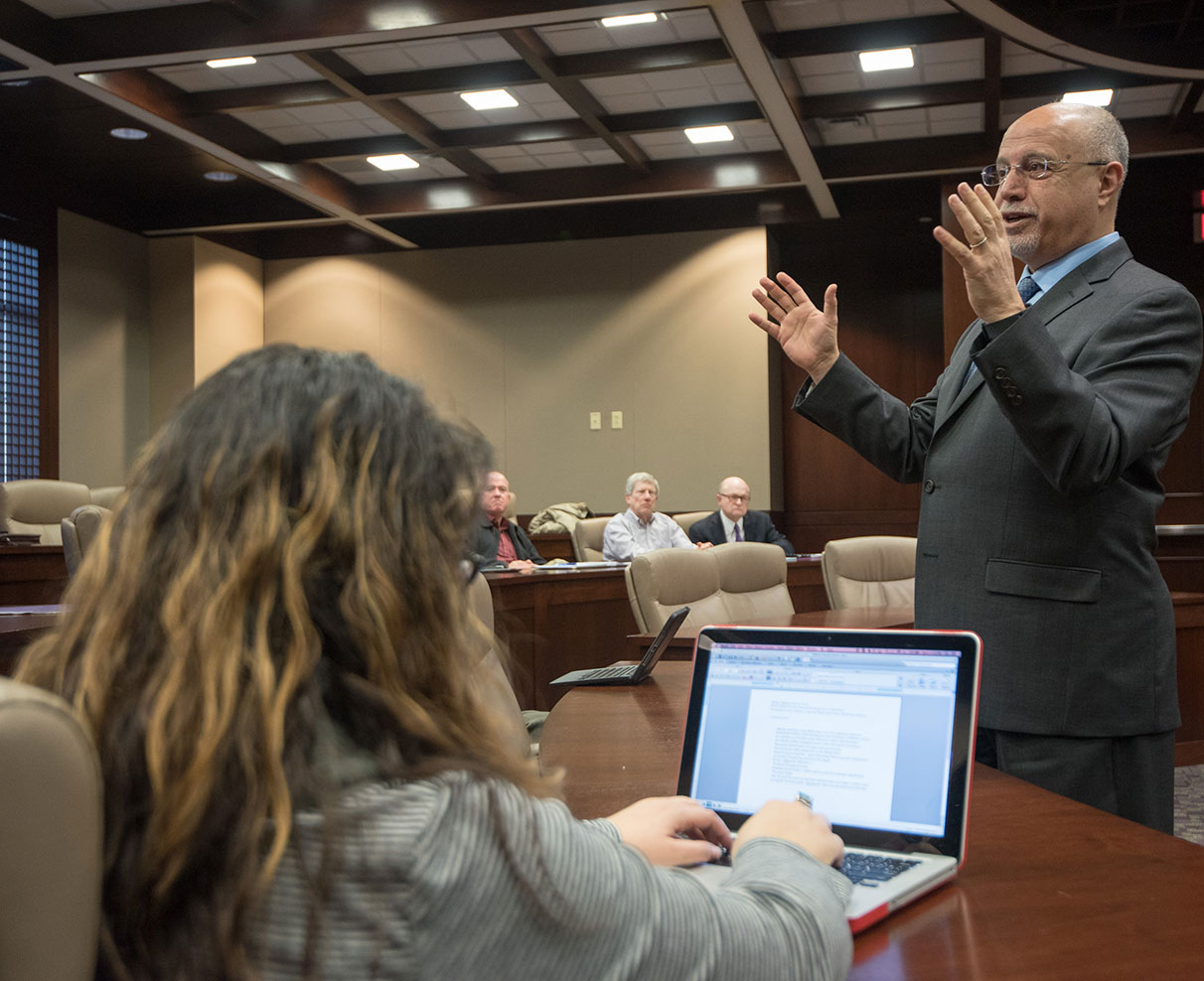The American Perception of the Middle East
Freedom, safety and being heard are worldwide aspirations — including those involved in the Arab Spring, says foreign policy expert Dr. Shibley Telhami at 17th annual Fogelson Honors Forum.

Dr. Shibley Telhami is the Anwar Sadat Professor for Peace and Development at the University of Maryland and a senior fellow at the Brookings Institution.
The American Perception of the Middle East
Freedom, safety and being heard are worldwide aspirations — including those involved in the Arab Spring, says foreign policy expert Dr. Shibley Telhami at 17th annual Fogelson Honors Forum.
For a professor who studies peace, foreign policy and international relations, there are a few simple things that make us all human.
“Everybody wants freedom. Everyone wants to be safe,” said Dr. Shibley Telhami of the University of Maryland, College Park. “They want their voice to be heard. That’s a human aspiration.”
Holding a doctorate in political science, Telhami is the Anwar Sadat Professor for Peace and Development at the Maryland campus. He also serves as a senior fellow at the Brookings Institution with an expertise in foreign policy and international relations.
Telhami spoke at TCU about American perceptions of the Middle East during the 17th annual Fogelson Honors Forum.
“Seventy percent of all Americans think that the Islamic State of the Levant is the single biggest threat facing the United States in the Middle East,” said the professor who visited TCU shortly after terrorist attacks in Paris.
Telhami found that 90 percent of Americans had either heard about or seen the gruesome videos of the Islamic State’s beheading prisoners and kidnap victims. “The American public wants to intervene for a very simple reason,” he said. “They see [the Islamic State] as an extension of al-Qaeda.”
Telhami said the American attitudes about events in the Middle East stem from several issues, including the influence of the Iraq War. In the professor’s view that war was never about whether the United States had the means to bring down Saddam Hussein; the issue was what would replace him.
“There was no economic crisis that was particularly unique in the history of [the Middle East]; we’ve faced these over and over.”
Dr. Shibley Telhami
As a result of Hussein’s fall, a form of anarchy ensued that allowed groups such as the Islamic State to form in an attempt to gain power, said Telhami. “Terrorism thrives where there is no central authority,” he said. “When there is a strong state, terrorism can’t find a place to hide.”
When a country’s stability is removed, said the professor, the people of that nation rely on personal identifiers, such as religion, as a way of uniting – or dividing – people.
After the Iraq War, anti-Americanism skyrocketed creating a less confident American public in terms of intervention in the Middle East. Western intervention will lessened, with its reaction to the Islamic State being the exception.
Telhmi said the colloquial term “Arab Spring” had a negative connotation for him, and he preferred “Arab Uprisings.” Although economic factors were called chief contributors in the events in 2010-11, the professor said he didn’t buy that cause.
“You have to persuade me that what happened in 2010-11 was a function of a unique set of circumstances that didn’t happen in, say, 2005 or 1995 or in 2000,” said Telhmi. “There was no economic crisis that was particularly unique in the history of [the Middle East]; we’ve faced these over and over.”
The main difference in the most recent Arab unrests, said the professor, was the information revolution. The first wave involved the proliferation of satellite TV and the Internet, which had a “huge impact” on the public’s ability to communicate. The second wave integrated the use of social media, which didn’t just allow people to have their voices heard; it empowered them.
“The information revolution took the monopoly of information away from governments,” he said.
A revolution needs a channel to communicate to the public in order to sustain it. Telhmi said the expansion of global interconnectedness has created an empowerment within the people of the Middle East, and it isn’t going anywhere anytime soon.

Your comments are welcome
Comments
Related Reading:
Campus News: Alma Matters
TCU’s Library Celebrates a Century
Uncover hidden gems of the academic hub, from vintage mechanics to modern masterpieces.
Campus News: Alma Matters
Infographic: TCU’s Shared Values
The Board of Trustees adopted four TCU values after considering input from more than 4,000 constituents.